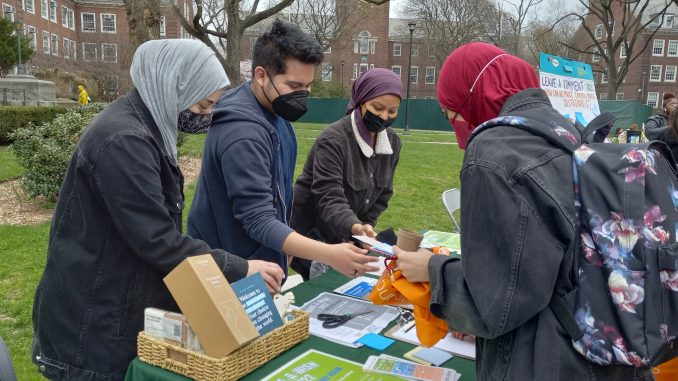
By Gabriela Flores
Reporting by Radwan Farraj
As April begins, so does Earth Month, which places emphasis on sustainability, environmentally-friendly practices, and other ways that humans can better the planet’s state. To kickoff Brooklyn College’s observance of the month, NYPIRG, the Undergraduate Student Government, and Campus Sustainability invited local green-thumbed organizations to share their initiatives with students on the East Quad lawn.
With a handful of community leaders in attendance, students were able to connect with initiatives like the Wyckoff House Museum, an East Flatbush-based organization that aims to educate and engage with New Yorkers on sustainable farming.
“We were looking forward to meeting some of the students here,” said Zack Strein, the museum’s manager. “For some students, we might be their immediate neighbors, for others they’re not our way. And for anyone interested in sustainability, urban agriculture, food system, where how those things relate to social justice, we hope to work together with those students and engage them in stewarding our space.”
Though Wycoff has been running for about 40 years, its current programs, that include using a public park as an educational garden for high schoolers, has been alive for approximately five to six years.
Beyond working hand-in-hand with community members on the city’s land, other organizations shared with BC students the importance of demanding state decision-makers to do more for New York’s environment.
“Our mission is to oppose corporate control and abuse of our most vital resources and ensure that government fulfills its obligation to protect our health, our communities, and our environment,” said Eric Weltman, a senior organizer of the Food and Water Watch, an organization that opposes fracked gas. For those who stopped by his table, Weltman asked them to sign a petition to Governor Kathy Hochul, the state legislature, Assembly, and Senate. The petition advocates for the state budget to include a bill called the All-Electric Building Act, which bans fracked gas and other fossil fuels in new buildings erected across New York despite the extraction method being prohibited in the state.
“Fracking is a dangerous method of extracting natural gas and oil,” Weltman said. “[…] So fracking, unfortunately, is still being done in Pennsylvania and Ohio. And that’s where New York State gets much of our gas – it’s fracked in other states. So even though like I said, we’ve banned fracking here in New York, we’re still very much reliant on fossil fuels and fracked gas in particular are from other states.”
At Brooklyn College, sustainability efforts are also taking shape across campus with resources like maps of bottle-filling stations installations distributed for all community members to use.
“There’s always new things coming up on how we can better reduce waste in new ways,” said Sondus Elboluk, a Campus Sustainability Public Health Ambassador. As COVID restrictions rolled back, her program’s focus has shifted from pandemic-related duties to increasing sustainability at Brooklyn College. One short-term goal the program has initiated includes the cafeterias’ latest addition of clear bins to allow students to discard unused plastic. Their goal? To demonstrate for onlookers how much plastic BC uses.
“This is to start engaging public opinion and awareness on the amount of plastic being used on campus,” said Bryant Tufino Flores, a Public Health Ambassador.
